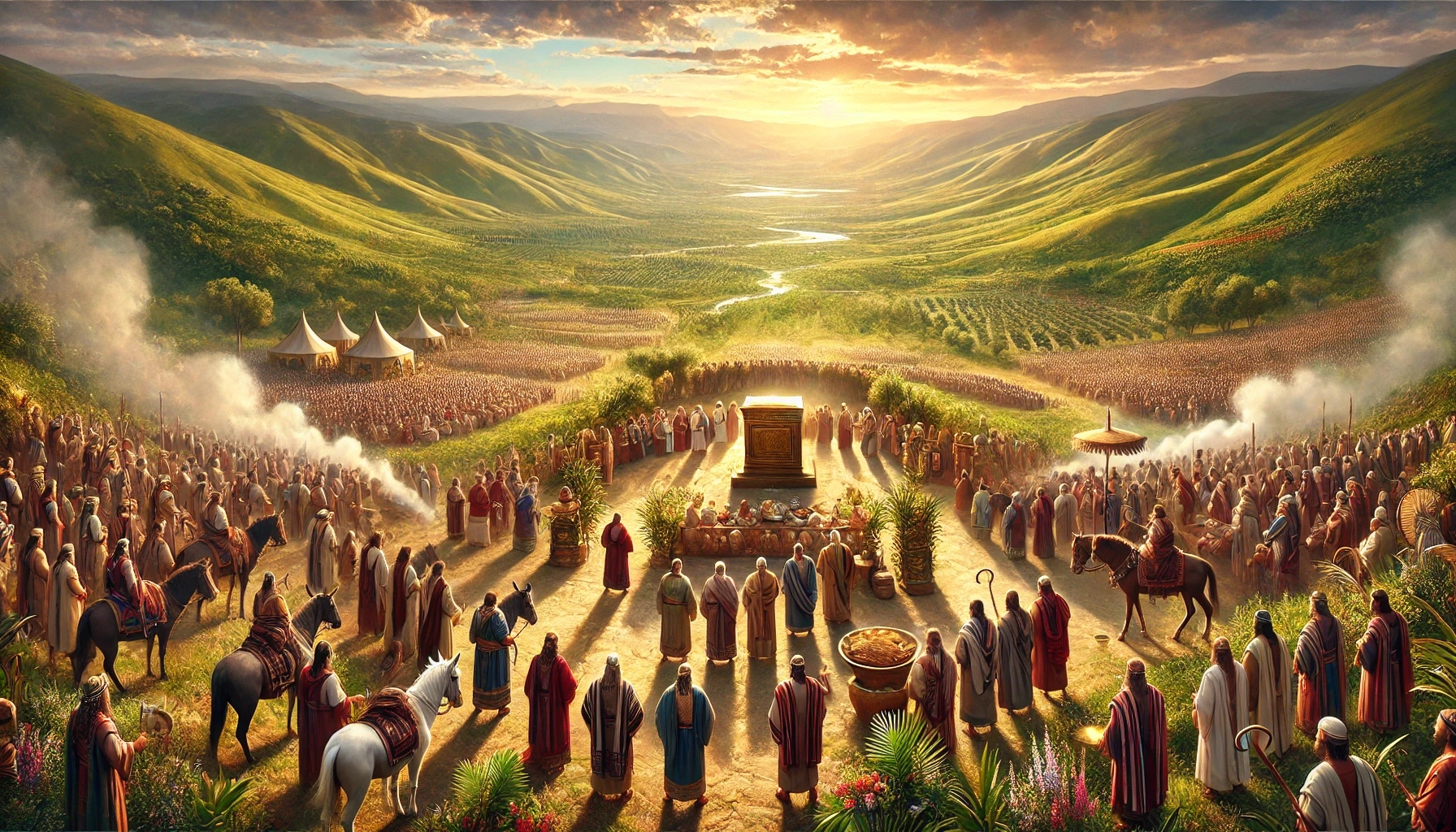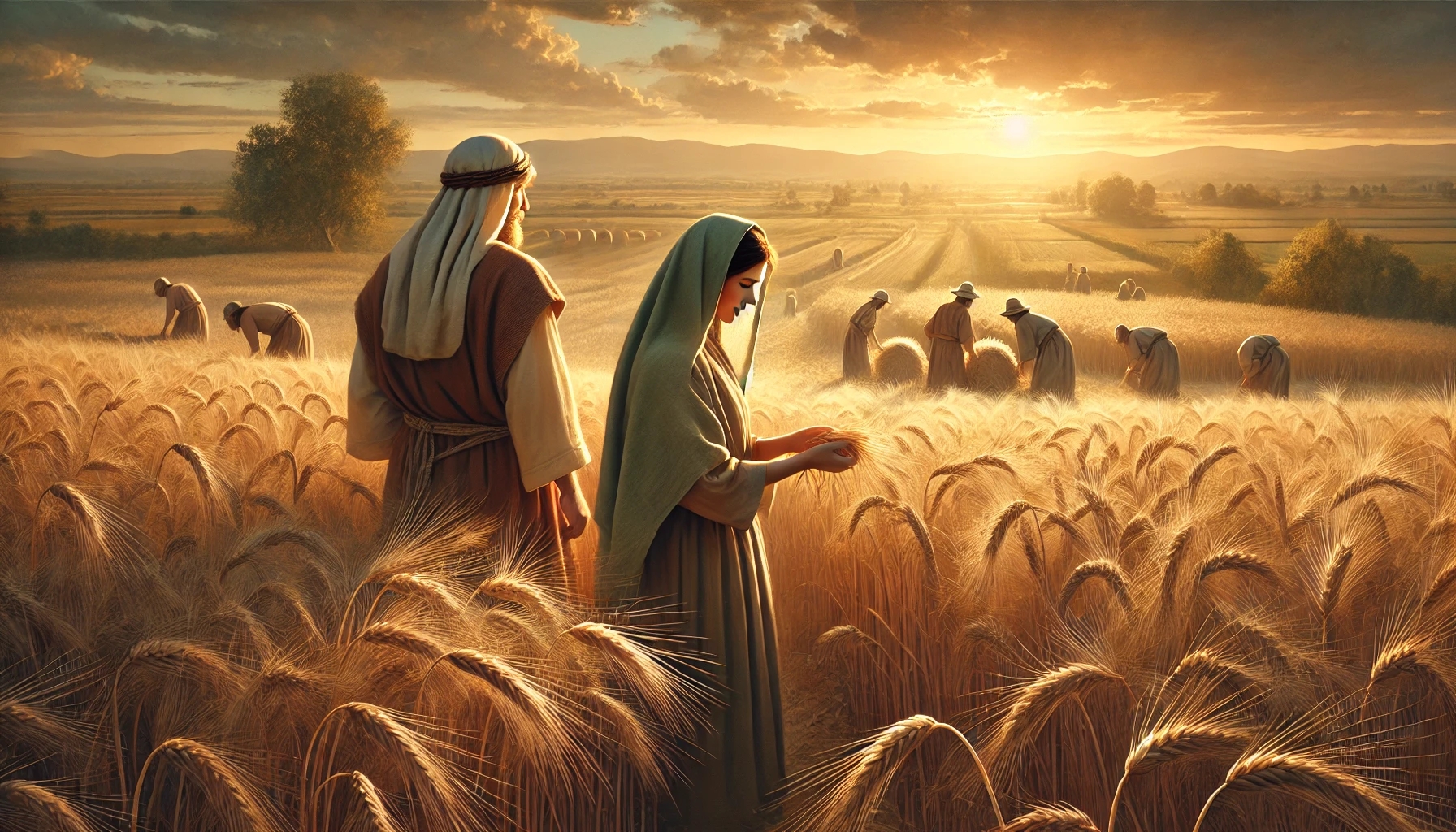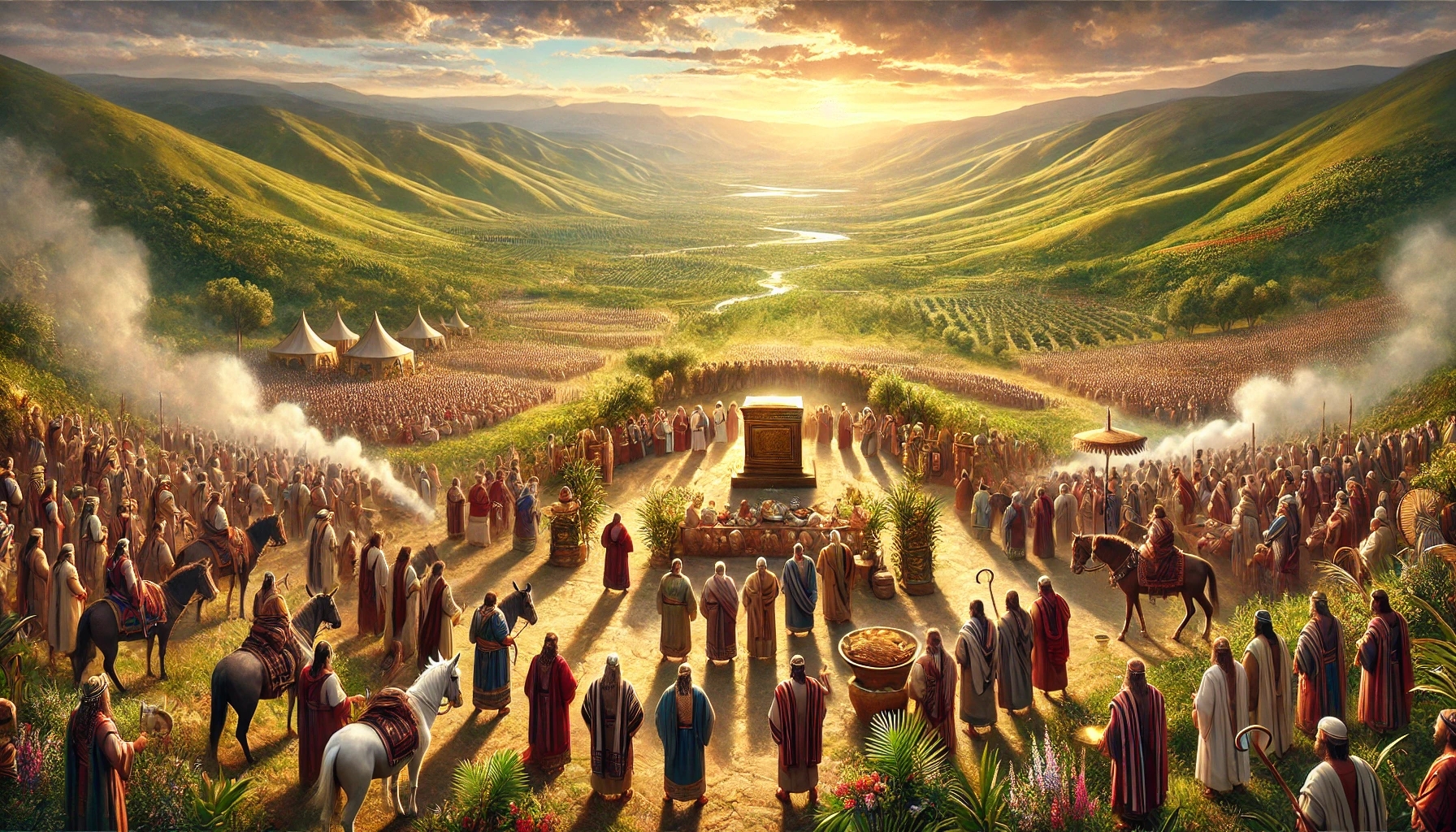 LESSONS OF FAITH FROM JOSHUA
LESSONS OF FAITH FROM JOSHUA
 Lesson 10 : The True Joshua
Lesson 10 : The True Joshua
 10.7 Questions
10.7 Questions
 Reflection and Application – The True Joshua and our personal journey of faith
Reflection and Application – The True Joshua and our personal journey of faith
 Introduction
Introduction
The final section of this lesson invites us to reflect on what we have studied and to make it personal. The story of Joshua is more than a report about conquest and warfare. In it we recognize a foreshadowing of Jesus Christ, who in a far greater way opens the true promised land — eternal life in the presence of God.
In this Sabbath School we ask:
How can typology help us understand Christ more deeply?
What does spiritual warfare mean in today’s world?
How can we draw hope from the promise of a better land?
……………………………..  ……………………………..
……………………………..
 Answers to the Questions
Answers to the Questions
 1. How does biblical typology help you better understand the work of Jesus Christ for you?
1. How does biblical typology help you better understand the work of Jesus Christ for you?
Answer:
Typology opens a deeper view of God’s plan of salvation. It shows that Jesus does not simply appear in isolation in the New Testament, but that His work is prepared throughout the entire Bible. When we see Joshua as a type, we understand:
-
Jesus is the greater Joshua, who does not merely defeat external enemies, but sin and death.
-
He does not lead us only into a geographical land, but into spiritual rest and the eternal inheritance.
-
Just as Joshua preserved the law and led the people in faithfulness, Jesus guides us in truth and grace.
Typology deepens our trust: God had a plan — from the very beginning.
 2. In what ways is our spiritual struggle similar to the conquest of Canaan, and in what ways is it different?
2. In what ways is our spiritual struggle similar to the conquest of Canaan, and in what ways is it different?
Answer:
Similarities:
-
Both battles require obedience, courage, and faith.
-
In both cases God stands beside us as leader and source of strength.
-
It is about taking hold of a promised inheritance that is not automatic but received through faithfulness.
Differences:
-
Joshua’s battle was physical, against nations and cities. Our battle is spiritual — against sin, temptation, doubt, and the powers of darkness (Eph. 6:12).
-
Joshua had a sword — we have the Word of God as the sword of the Spirit.
-
Our victory is not shown through possession of land but through a changed life.
 3. Consider the ultimate fulfillment of the Joshua typology. How does the picture of a world without pain, suffering, and death give us real hope in the daily challenges of life?
3. Consider the ultimate fulfillment of the Joshua typology. How does the picture of a world without pain, suffering, and death give us real hope in the daily challenges of life?
Answer:
The look toward the “promised land” of Revelation 21 comforts us:
-
No tears, no suffering, no death — this is not wishful thinking, but God’s promise.
-
In the midst of sickness, loss, and despair we can say: “This is not the end.”
-
The daily struggle becomes lighter when we know that Jesus, the true Joshua, will bring us safely to the goal.
-
We live from hope, not from fear.
 4. Joshua reflected God’s character in such a way that he anticipated the ministry of Christ. How can you very concretely give Jesus more room to reflect His character more fully in you?
4. Joshua reflected God’s character in such a way that he anticipated the ministry of Christ. How can you very concretely give Jesus more room to reflect His character more fully in you?
Answer:
-
Through time with Jesus: in Scripture, in prayer, and by listening to the Holy Spirit.
-
By not fighting our battles alone, but consciously accepting Him as leader.
-
By contemplating His character (2 Cor. 3:18): humility, faithfulness, willingness to sacrifice.
-
By choosing His way in the small daily decisions — instead of the easy or convenient one.
-
By living intentionally as a bearer of light in family, church, and work.
……………………………..  ……………………………..
……………………………..
 Spiritual Principles
Spiritual Principles
-
Jesus is the true Joshua — through Him we enter the eternal inheritance.
-
Spiritual warfare is real, but we never fight alone.
-
The Bible is one unified testimony of God’s plan — from Moses to Revelation.
-
Hope is not a feeling, but a spiritual reality.
-
Transformation happens by beholding Jesus, not by effort.
……………………………..  ……………………………..
……………………………..
 Life Application
Life Application
-
Read the Bible daily and ask: What does this text show me about Christ?
-
Move closer to your “Canaan” today — through a step of faith or obedience.
-
Do not fight temptation alone — ask for the armor of God.
-
Encourage others with this promise: “Your inheritance is secure — your leader is faithful.”
-
Live daily as someone who already rests in grace.
……………………………..  ……………………………..
……………………………..
 Conclusion
Conclusion
Joshua was a servant of God — faithful, courageous, obedient. But he was only a shadow. Jesus Christ is the light.
He not only showed the way — He is the way. In Him we have access to an inheritance that never fades.
Every trial, every decision, every battle is redefined by His presence: “Be strong and courageous, for I am with you.”
……………………………..  ……………………………..
……………………………..
 Thought of the Day
Thought of the Day
“The battle is not over — but the victory is certain. For Christ goes before you.”
……………………………..  ……………………………..
……………………………..
 Illustration
Illustration
The Call Beyond the Wall
When faith breaks through — a story of struggle, calling, and inheritance
Chapter 1 – The Wall
Lucas was 27. An engineer, rational, efficient — but empty inside. He lived in Berlin, had a good career, a neat apartment — and a panic-ridden hidden doubt: “Is this all there is?”
God had been only a childhood memory. The Bible? A thick, foreign book. But lately he began having dreams — an endless land, golden wheat fields … and a wall. Always the wall.
One evening he found a Bible reading plan in an app: “The True Joshua.” He clicked — out of curiosity. And read:
“How long will you wait before you begin to take possession of the land the Lord, the God of your ancestors, has given you?” (Joshua 18:3)
Something hit him. Deeply.
✦ ─────────────── ✦ ─────────────── ✦
Chapter 2 – The Call
In the days that followed, Lucas kept reading. He learned about Joshua, who led Israel into the promised land — not by his own strength, but by trusting God.
The picture became clearer: the wall in his dreams was not outside — it was inside.
He began to pray. Haltingly. Awkwardly. But in the silence he sensed something: a gentle, insistent call.
One sentence burned in his mind:
“Lucas, you are living before the border — not in your inheritance.”
✦ ─────────────── ✦ ─────────────── ✦
Chapter 3 – The Battle Begins
Daily life suddenly became a battlefield. Lucas struggled with:
-
Old guilt resurfacing
-
Temptations pressing in
-
Thoughts like: “You’re not worthy. You can’t do it.”
But then he read Ephesians 6:
“Put on the full armor of God …”
He wrote verses on sticky notes, placed them around his apartment. He started praying daily. It wasn’t easy — but it was real.
✦ ─────────────── ✦ ─────────────── ✦
Chapter 4 – New Vision
One morning he saw Berlin differently: not as a gray city, but as a place full of people standing before walls, just like him.
He realized: Christ didn’t come only for “his personal peace” — but for an entire world.
He began serving in his church. A youth group. Conversations with doubters. Someone soon asked him:
“How did you start believing?”
He smiled: “With Joshua. And a wall.”
✦ ─────────────── ✦ ─────────────── ✦
Chapter 5 – Breakthrough
The dreams stopped — not because the wall vanished, but because Lucas walked through it.
He no longer lived in fear, but in calling.
Not before the land — but within it.
One Friday night he preached for the first time — nervous, sweating, but honest. He told of Joshua, of Jesus — and of himself.
At the end, an old man whispered to him:
“I stood before the wall all my life. Today I stepped over it.”
……………………………..  ……………………………..
……………………………..
 Closing Thoughts on the Story
Closing Thoughts on the Story
Lucas’ journey is our journey.
Many Christians, like Israel, stand at the border to their inheritance — but hold back because of fear, doubt, or comfort.
But the true Joshua — Jesus Christ — calls us onward.
He fights with us. He leads us.
He gives not just new land, but a new heart.
……………………………..  ……………………………..
……………………………..
 Conclusion and Spiritual Application
Conclusion and Spiritual Application
-
Even if you think you’re not ready — God is.
-
Your “promised land” is not a location, but a new reality in Christ.
-
Fight with spiritual weapons — God’s Word, prayer, truth.
-
Hear the call: “How long will you wait?”
-
Step forward in trust — the wall falls when you move.
 6 december 2025
6 december 2025 BELIEVE HIS PROPHETS
BELIEVE HIS PROPHETS Daily Bible Reading
Daily Bible Reading Ruth 2 – Grace in the Unknown Field
Ruth 2 – Grace in the Unknown Field When God opens doors in everyday life
When God opens doors in everyday life Read online
Read online  Introduction
Introduction Commentary
Commentary Summary
Summary Message for us today
Message for us today God works in the everyday, not only in the supernatural.
God works in the everyday, not only in the supernatural. Thought to ponder
Thought to ponder
 4 – 6 December 2025
4 – 6 December 2025 Ellen White | Patriarchs and Prophets – Chapter 46
Ellen White | Patriarchs and Prophets – Chapter 46 The Blessings and the Curses | When walls break before faith
The Blessings and the Curses | When walls break before faith BLOG 3
BLOG 3 The People Respond
The People Respond 6 December 2025
6 December 2025 Daniel – Strong in Faith. Faithful in the Fire
Daniel – Strong in Faith. Faithful in the Fire 7. Lions’ Den & Loyalty of Faith – When God matters more than your safety
7. Lions’ Den & Loyalty of Faith – When God matters more than your safety Daily Verse
Daily Verse Introduction: When faith has no guarantees
Introduction: When faith has no guarantees Devotional – The night of decision
Devotional – The night of decision What does this mean for us?
What does this mean for us? What we can learn from Daniel
What we can learn from Daniel Practical steps for today
Practical steps for today Questions to reflect on
Questions to reflect on Prayer
Prayer Key thought of the day
Key thought of the day LESSONS OF FAITH FROM JOSHUA
LESSONS OF FAITH FROM JOSHUA Lesson 10 : The True Joshua
Lesson 10 : The True Joshua 10.6 Summary
10.6 Summary Jesus – The Greater Joshua and Our Eternal Leader
Jesus – The Greater Joshua and Our Eternal Leader Introduction
Introduction BIBLE STUDY
BIBLE STUDY 1. Typology – God’s Method of Revelation
1. Typology – God’s Method of Revelation Life Application
Life Application Conclusion
Conclusion Thought of the Day
Thought of the Day Illustration
Illustration Final Thoughts on the Story
Final Thoughts on the Story TEASER – THE BOOK OF RUTH
TEASER – THE BOOK OF RUTH Why the Book of Ruth is relevant today
Why the Book of Ruth is relevant today
 It takes place during the time of the Judges – between Joshua and Samuel.
It takes place during the time of the Judges – between Joshua and Samuel. Faithfulness in crisis
Faithfulness in crisis She leaves her homeland, family, and gods – to follow Naomi and the God of Israel.
She leaves her homeland, family, and gods – to follow Naomi and the God of Israel. 1. Your background does not limit your calling
1. Your background does not limit your calling Ruth 1:16 – “Where you go I will go… your God will be my God.”
Ruth 1:16 – “Where you go I will go… your God will be my God.” Conclusion:
Conclusion: 5 december 2025
5 december 2025 BELIEVE HIS PROPHETS
BELIEVE HIS PROPHETS Ruth’s decision in the valley of loss – how loyalty and faith open new paths
Ruth’s decision in the valley of loss – how loyalty and faith open new paths Read online
Read online  Introduction
Introduction Commentary
Commentary Summary
Summary Message for us today
Message for us today Thought to ponder
Thought to ponder Today Ruth’s story invites you to trust anew – even if your life does not look hopeful right now. Perhaps your “barley harvest” is just beginning.
Today Ruth’s story invites you to trust anew – even if your life does not look hopeful right now. Perhaps your “barley harvest” is just beginning.
 4 – 6 December 2025
4 – 6 December 2025 Ellen White | Patriarchs and Prophets – Chapter 46
Ellen White | Patriarchs and Prophets – Chapter 46 The Blessings and the Curses | When walls break before faith
The Blessings and the Curses | When walls break before faith BLOG 2
BLOG 2 The Stone with Writing
The Stone with Writing